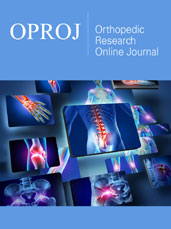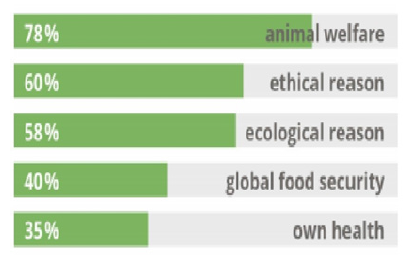- Submissions

Full Text
Orthopedic Research Online Journal
A Narrative Review on the Benefits of the Vegan Diet on Nutritıonal and Environmental Aspects
Onur Oral1*, Zeinab Rezaee2, George N Nomikos3 and Nikitas N Nomikos4
1Department of Sports Sciences, Turkey
2Department of Exercise Physiology, Iran
3Department of Orthopaedic Surgery, Greece
4Department of Physical Education & Sport Science, Health Sciences and Sports, Greece
*Corresponding author:Onur Oral, Department of Health Sciences and Sports, Turkey
Submission: April 04, 2022;Published: April 27, 2022

ISSN: 2576-8875 Volume9 Issue3
Abstract
Purpose: The aim of the study is to examine the vegan diet which is generally preferred due to ethical concerns, is against the use of animals in the industrial system and discuss the role of a vegan diet on individual health and the balance of the ecosystem
Methods:In the search for scientific literature related to this review the US National Library of Medicine (PubMed) used MEDLINE and Sport Discus data and the terms “genetics”, ‘’ecosystem’’, “vegan diet”, “vegetarian”, and “healthy nutrition” were used. The relevant literature has also taken its source from the research of relevant articles from reference lists derived from data studies
Results: Some studies indicate that a vegan diet provides various benefits for health as also according to some research, it could be also beneficial for the environmental ecosystem. So all these studies related to the vegan diet, which are claimed to contribute positively to the protection of individual health and ecosystem balance, should be followed closely.
Conclusion: Studies indicate that because the vitamins and minerals found in fruits and vegetables have positive effects on many cells involved in immune function, a plant-based (vegan) diet can contribute to immune system function and help keep the body healthy.
Keywords: Vegan diet; Healthy nutrition; Vegetarian; Ecosystem
Introduction
First of all, vegans adopt this philosophy into their lives for various reasons and regulate their preferences based on them [1]. These reasons could be mainly specified as health, environment, animal rights, sensory disgust, and so on [2]. For instance, a survey carried out in 2017, which figure is demonstrated below, shows the motives for being vegan in Switzerland with the rates. In this Figure 1, it is pointed out that the most important motive for being vegan is animal welfare with the rate of 78%, whereas health reasons come as the last with the rate of 35%. Besides, according to this survey, the most common motives are stated as ethical reasons, ecological reasons, and global food security in Switzerland [3]. In vegan diets, foods or nutritional sources are adopted into daily meals and consumed by vegans considering these motives. In veganism, which is the strictest form of vegetarianism consisting of a wide range of classifications depending upon the appropriate choices of animal products and plants, animal products are completely avoided and a plant-based diet is adopted [4]. In these diets, fruits, vegetables, nuts, whole grains, soy seeds [5-7], legumes, and healthy fats are mostly preferred and consumed as nutritional sources and the benefits of them on health are also reported [8,9]. These diets generally include high levels of magnesium, folic acid, vitamin C and E, iron, and fiber, whereas they might be also lower in saturated fat, cholesterol, longchain n-3 (omega 3) fatty acids, vitamin D, calcium, zinc, and B-12 [10]. However, with suitable planning, avoided foods and products might be substituted to compensate for the lack of lower levels of vitamins and other minerals in these diets.
Figure 1:A survey showing the motives for adopting a vegan diet in Switzerland in 2017. 78% of the motives are formed by animal welfare, while the second one is the ethical reason at a rate of 60%. In addition, 58% of them are ecological reasons, whereas 40% of them are global food security. In the last Place, there is “own health” at a rate of 35% [3].

Discussion
According to a study consisting of 450,000 participants, it is pointed out that every 50 grams of processed meat per day increase the risk of cardiovascular and malignant mortality at a rate of 18% since there are carcinogenic nitrosamines, cholesterol, and saturated fats [11], which shows that when the benefits of a plantbased diet, such as a vegan or vegetarian diet, are considered, the consumption of processed meat should be limited. Instead, a vegan diet might be encouraged. In a study, which aim was to determine the association between overall cancer cases and dietary patterns such as vegan, lacto-vegetarian, non-vegetarian, pesco-vegetarian, and so on among 69,120 participants of the Adventist Health Study-2, with 2939 cancer cases, it was found that there was a statistically significant decrease of the risk of the gastrointestinal system cancers for vegetarians and lacto-ovo-vegetarians, while there was statistically significant protection detected against overall cancer cases in both genders and for female-specific cancers risk of vegans [12]. In a study carried out by Tom et al. [13] with 77,659 participants, it was reported that when compared with non-vegetarians with a comparable background, vegetarians have a 22% lower risk of all colorectal cancers. In addition, it is also demonstrated that a pescovegetarian diet was linked with the lowest risk of colorectal cancer, which is a 43% lower risk, whereas semi-vegetarians were associated with the highest risk among other plant-based dietary patterns, which is at the rate of 8%, closer to the risk that meat-eaters face [13]. Apart from other studies, surprisingly, in a study carried out by Marlow et al. [14] it is reported that adopting a plant-based diet as a nutritional lifestyle could contribute to the three-fold reduction of greenhouse gas emissions that would support climate change mitigation [14], which indicates vegan diet could provide benefits on the environment as vegans pursue this aim at some point.
Conclusion
The number of people who prefer vegan nutrition is increasing day by day, considering the possible harms that may be caused by animal-based nutrition in order to protect the ecosystem. It is emphasized that a plant-based diet style can help individuals protect against chronic, degenerative, inflammatory diseases and control their body weight. Apart from that, they are thought to be less frequently affected by viruses, bacteria, and similar diseases, as they contribute to immune system function. In addition to all these, there are many examples of successful athletes in the world of sports, showing that vegetarian diets can be very beneficial and effective for athletes, together with a balanced and appropriate nutrition plan. For this reason, to raise awareness about the benefits of vegetarian nutrition on athlete health, vegetarian diets should be carefully examined so that it may be possible in terms of revealing important results about vegetarian nutrition. As a result, as is indicated in different studies, the number of vegans is increasing worldwide day by day and every day new people adopt this lifestyle and regulate their preferences based on this ideology. When all the advantages of a vegan diet are considered, awareness related to this plant-based diet such as veganism should be increased more and more. In addition, vegans should be encouraged and the bias toward veganism should be removed by increasing the knowledge and sharing information among people.
Acknowledgement
We would like to express our special thanks of gratitude to Evangelia STAVROPOULOU for her very successful contribution for the literature research process and unique academic support in the publication process of this review article.
Conflict of Interest
The author certifies that there is no conflict of interest with any financial organization regarding the material discussed in the manuscript.
Funding
The author certifies that there is no funding of any financial organization regarding the material discussed in the manuscript.
Author’s Contributions
All authors read and approved the final version of the manuscript.
References
- Dyett PA, Sabaté J, Haddad E, Rajaram S, Shavlik D (2013) Vegan lifestyle behaviors. An exploration of congruence with health-related beliefs and assessed health indices. Appetite 67: 119-124.
- Ruby MB (2012) Vegetarianism. A blossoming field of study. Appetite 58(1): 141-150.
- https://www.swissveg.ch/node/2189
- Lanham New SA (2009) Is vegetarianism a serious risk factor for osteoporotic fracture? The American Journal of Clinical Nutrition 90 (4): 910-911.
- Haddad EH, Berk LS, Kettering JD, Hubbard RW, Peters WR (1999) Dietary intake and biochemical, hematologic, and immune status of vegans compared with nonvegetarians. Am J Clin Nutr 70(3): 586S-593S.
- Larsson CL, Johansson GK (2005) Young swedish vegans have different sources of nutrients than young omnivores. J Am Diet Assoc 105(9): 1438-1441.
- Larsson CL, Johansson GK (2002) Dietary intake and nutritional status of young vegans and omnivores in Sweden. Am J Clin Nutr 76(1): 100-106.
- Key TJ, Appleby PN, Rosell MS (2006) Health effects of vegetarian and vegan diets. Proc Nutr Soc 65(1): 35-41.
- Spencer EA, Appleby PN, Davey GK, Key TJ (2003) Diet and body mass index in 38 000 EPIC-Oxford meat-eaters, fish-eaters, vegetarians, and vegans. International Journal of Obesity 27(6): 728-734.
- Davey GK, Spencer EA, Appleby PN, Allen NE, Knox KH, et al. (2003) EPIC-Oxford: lifestyle characteristics and nutrient intakes in a cohort of 33 883 meat-eaters and 31 546 non-meat-eaters in the UK. Public Health Nutr 6(3): 259-268.
- Rohrmann S, Overvad K, Mesquita HB, Jakobsen MU, Egeberg R, et al. (2013) Meat consumption and mortality results from the European Prospective Investigation into Cancer and Nutrition. BMC Med 11: 63.
- Tantamango Bartley Y, Jaceldo Siegl K, Fan J, Fraser G (2012) Vegetarian diets and the ıncidence of cancer in a low-risk population. Cancer Epidemiology Biomarkers & Prevention 22(2): 286-294.
- Tom MS, Fischbeck PS, Hendrickson CT (2015) Energy use, blue water footprint, and greenhouse gas emissions for current food consumption patterns and dietary recommendations in the US. Environment Systems and Decisions 36(1): 92-103.
- Marlow HJ, Hayes WK, Soret S, Carter RL, Schwab ER, et al. (2009) Diet and the environment: do what you eat matter? Am J Clin Nutr 89(5): 1699S-1703S.
© 2022 Onur Oral. This is an open access article distributed under the terms of the Creative Commons Attribution License , which permits unrestricted use, distribution, and build upon your work non-commercially.
 a Creative Commons Attribution 4.0 International License. Based on a work at www.crimsonpublishers.com.
Best viewed in
a Creative Commons Attribution 4.0 International License. Based on a work at www.crimsonpublishers.com.
Best viewed in 







.jpg)






























 Editorial Board Registrations
Editorial Board Registrations Submit your Article
Submit your Article Refer a Friend
Refer a Friend Advertise With Us
Advertise With Us
.jpg)






.jpg)














.bmp)
.jpg)
.png)
.jpg)










.jpg)






.png)

.png)



.png)






